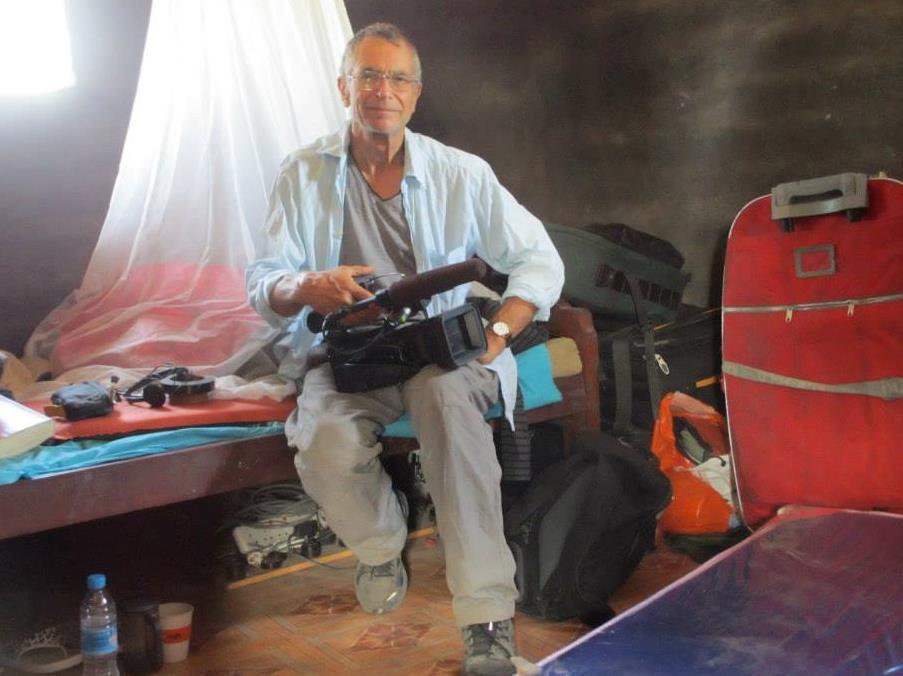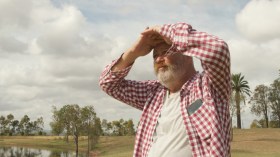Image; Tom Zubrycki working on Hope Road in South Sudan in 2014.
Screenhub note: Tom Zubrycki’s Currency House Platform Paper, The Changing Landscape of Australian Documentary, sees the history of the form through the eyes of a maker determined to tell stories expanding our point of view. It is a pretty good account, fluidly written and a pleasure to read.
He is a true veteran of Australian documentary who started in community-based production of short films in the 1970’s, and has now made seventeen full length films on politically engaged themes with a strong interest in observational material. By the mid-Nineties he was producing or executive producing documentaries for other directors which gave him broader experience of raising finance and working with broadcasters.
We are pleased to republish a section about a current issue which enrages filmmakers committed to a broader, more expansive vision of documentary investigation.
Here is Zubrycki’s piece:
———————-
In recent years we have seen a radical shake out in the old television broadcast model. So what place will documentary have in this new factual environment? According to statistics released by Screen Australia, documentary series production rose from 295 hours in 2011–12 to 366 hours in 2016–17. Yet only 21 single-title documentaries were shown on television or cable in 2016–17 compared to 51 five years earlier. This includes commissions and acquisitions.
The two public broadcasters are largely format and series driven; though they still commission a small number of one-offs. SBS annually commissions four single documentaries for the Untold Australia series, while ABC commissions some single documentaries preferring that they play across multiple platforms. True Crimes Stories is a recent example. Budget cutbacks, especially at the ABC, play a bigger part in commissioning considerations than ever before. Also it’s cheaper for ABC and SBS to market a series than an individual program. Rating requirements dominate broadcast decisions, even more so now that online has severely cut into TV audiences. How many times have we been told, ‘You have an excellent program but it’s too niche for us. We’re only interested in subjects that have broad public appeal.’
Eventually many (but, unfortunately not all) of the documentaries funded through the various state and federal agencies are purchased by the broadcasters, once they are presented to them as acquisitions. But when they do make a purchase, it is at a fraction of the cost of commissioning them. This was the case with The Namatjira Project, the iconic story of the Namatjira family, tracing their quest to regain the copyright of their grandfather’s artwork. The film was originally turned down by the ABC, but when it was broadcast by the network in 2017 it achieved excellent ratings, and audiences gave it a score of nine out of ten on internal measures of quality and distinctiveness.
With these results it’s a shame that the ABC doesn’t commission more one-off’s, rather than waiting and then acquiring them at bargain price on completion. Although Steve Bibb, Head of Factual, seems to leave the door open:
From my commissioning point of view, I don’t have a specific policy in relation to series and one-offs for Factual […] To me, it’s always about the strength of the story. […] Creativity, storytelling, form and what’s best for the audience should lead.
Where once there existed a whole range of small independents whose business plan relied on a broadcast commission every one or two years, now there are few – and fewer still who work in the area of co-production. One exception is Simon Nasht of Smith & Nasht. His latest feature as executive producer is a one-hour science documentary, The Kingdom of Fungi, directed by Annamaria Talas. Fungi, the world’s largest and oldest of organisms, was a subject with genuinely universal appeal.
Nasht wanted to fund the film as an official co-production with CBC in Canada and for that he needed an Australian broadcast partner. The ABC declined a pre-sale. Eventually National Geographic (Australia) consented, which triggered the ‘pathway to (local) audience’ required by Screen Australia’s Offset Department. Then European and North American distributors signed up and Nasht was able to start production. A year later the program had been sold to more than twenty countries and won several major awards. According to Nasht, himself a producer of 25 years’ experience: ‘It’s never been tougher because the domestic market is so thin.’
Chris Hilton, CEO of Essential Media, and one of Australia’s most prolific producer/directors, likewise struggled to fund his series Living Universe, which examines the quest to find extra-terrestrial life by ‘the brightest minds in space exploration’. The documentary, a combination of a four-part series and a feature documentary, is allegedly the most expensive ever made out of Australia and took six years to finance and produce. Living Universe did get a licence fee from the ABC, but at a reduced rate. Marketplace attachments that flowed into the budget were: distribution guarantees against various territories, presales from North American streaming sites and European broadcasters, grants from Screen Australia, Create NSW, the Offset and investment from a post-production house. The 90-minute version played at Event Cinemas and very quickly afterwards the series appeared on the ABC.
The Kingdom of Fungi and Living Universe are complex and expensive projects to finance out of Australia, mainly because national broadcasters have a remit to commission Australian stories. This gives them a perfect reason to say ‘no’. However, they do not shy away from re-makes of foreign formats that have been developed and road-tested overseas.
While Kim Dalton was Head of Television at the ABC TV (2006–13), the broadcaster had a blanket ban placed on foreign formats. This is no longer the case. SBS never had that reservation. In the 2017–18 financial year, Screen Australia funded five factual series based on formats developed overseas, including Filthy Rich and Homeless, Teenage Boss and War on Waste 2. The agency contributed $2.66 million to these series: 17 per cent of the total Documentary Department budget. This has caused considerable alarm. On 25 May 2018, 37 producers, concerned at the impact this was having on the local independent sector, put their names to a submission pressing Screen Australia to refuse to finance such productions.
Every foreign format produced means that a local production opportunity has been lost. Local ideas create Australian owned IP—giving future income potential to local companies and investors—[and] raise the expertise in the local talent pool in program development. Locally developed shows help sustain an economically viable independent production sector.
Getting behind original Australian formats is to me a ‘no brainer’. It makes sense for screen agencies to assist in the development of new formats, and the idea of a ‘format lab’ is gaining in popularity. Anything to quell the tide of overseas formats dominating our small screens and devices.
The producers’ submission also raised alarm about BBC Studios, a new Australian production arm of the BBC opening its doors in Sydney. The company will be eligible to apply for Screen Australia funding despite being the operator of five TV channels in Australia broadcast on Foxtel. One of the quirks of the broadcasting regulatory landscape is that instead of the channel itself holding the broadcasting licence, Pay TV carriers are the licensees of all the channels they carry. The letter demanded that the BBC Studios loophole be closed immediately:
The relaxation of funding restrictions, together with reduced funding and consolidation of foreign ownership of the local industry, is increasing competition for ever-diminishing Screen Australia production investment. The few remaining Australian-owned companies must now compete in the domestic market against extremely well-resourced, vertically integrated multi-nationals, which are receiving public funds designed to encourage Australian culture.
Responding to the producers’ submission Michael Brealey, Chief Operating Officer of Screen Australia, responded. ‘Screen Australia sees value in not limiting which projects can receive its funding, provided at all times they will be made as Australian stories of relevance and interest to local audiences.’
Screen Australia’s response has stunned the sector. It has always been assumed that industry programs are meant solely to support Australian cultural producers, but apparently this is no longer the case.





